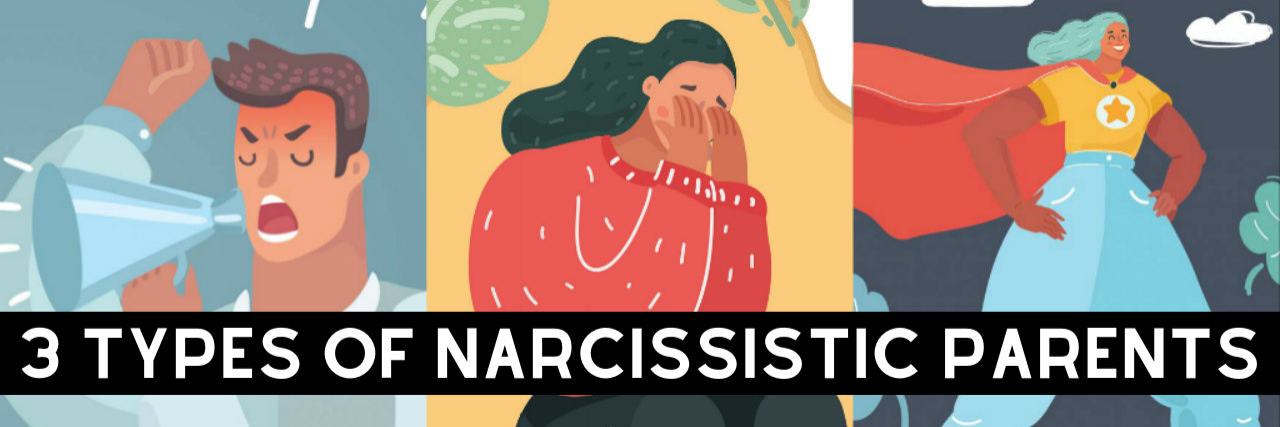Did your father make everything about himself, insist he was the greatest father alive and lash out in anger if anyone suggested otherwise? Was your mother unable to cope with her emotions, insisting her pain was greater than everyone else’s — including your own? Did your parent care more about making you into a “mini me” than encouraging you to develop your own unique identity?
These situations are small snapshots into what life with a narcissistic parent can be like. If these examples sound familiar, you’re not alone. Recovering from a childhood dominated by a narcissistic parent takes time and support from safe people in your life.
What Is a Narcissistic Parent?
Before we get into what makes a parent narcissistic, it’s important to define what a narcissist is. A narcissist is someone who has an inflated sense of self-importance, a deep desire to be admired by others and is primarily concerned with meeting their own needs — sometimes at the expense of people in their lives.
Narcissism is a personality trait, not a psychiatric diagnosis. A narcissistic person does not necessarily have narcissistic personality disorder (NPD), nor are they inherently abusive (though in some cases, they can be).
“The more extreme the narcissism (and the more disordered the narcissist) the more likely you are to see physical and emotional abuse,” Craig Malkin, Ph.D., lecturer at Harvard Medical School and author of “Rethinking Narcissism,” told The Mighty.
Like most traits, narcissism exists on a spectrum — and the truth is, we’re all a little narcissistic to some degree! As humans, we long to feel special and be recognized for our gifts and talents. But narcissism can become toxic or harmful to others when it isn’t developmentally appropriate. For example, there’s a huge difference between a toddler acting as if he’s the center of the universe and a mother neglecting her children by always prioritizing her needs and desires above all else.
Which leads us to narcissistic parents. Narcissistic parents are people who are excessively preoccupied with themselves and in some cases, believe their children solely exist to fulfill their needs. Unsurprisingly, this can do enormous emotional damage to children in the long-run.
“A narcissistic parent is [someone who] lacks the capacity to consistently care for and honor the dignity, well-being and personhood of their child in a way that a child requires for their adequate emotional and mental development,” licensed psychotherapist, Annie Wright, LCSW, explained.
Types of Narcissistic Parents
According to Dr. Malkin, there are three basic types of narcissistic parents — classic (extroverted), covert (introverted) and communal. It’s important to understand these different types so you can better understand (and heal) from your experience growing up.
“All narcissists are addicted to feeling special, they just go about feeling special in different ways,” he said.
As a reminder, parents who exhibit narcissistic traits are not automatically abusive, but the more narcissistic (and usually disordered) the parent is, the more likely they are to abuse their children.
1. Classic Narcissist

When we hear the word “narcissism,” we typically think of someone who would fall into the classic, or “extroverted” narcissistic type. In terms of an extroverted narcissistic parent, picture someone who expresses their desire to feel special outwardly and isn’t shy about viewing their child as a tool for furthering their own goals and needs.
“A classic example of a narcissistic parent is one who is not truly interested in who the child actually is, but who instead sees the child as an extension of themselves and wants the child to be and become what they — the parent — wants them to be,” Wright told The Mighty. “This can look like dictating how a child dresses, what activities they become involved in, what their major is and even planning what career the adult child will have.”
Classic or “overt” narcissism is usually pretty easy to spot, but can still do enormous damage to a child who relies completely on their narcissistic parent to provide for their needs.
Common Behaviors of Classically Narcissistic Parents:
- Boasting of their child’s accomplishments as if they were their own accomplishments.
- Shaming or belittling a child’s accomplishments if they feel threatened by the child’s success.
- Only showing love to a child if they act in a way that is pleasing to them. Withholding love if a child doesn’t bend to their will or desires.
2. Covert Narcissist

Covertly narcissistic parents (also called “introverted” or “hypersensitive”) still crave special attention, but instead of demanding it as obviously as the classic narcissistic type, they go about getting their needs met in a “quiet” or roundabout way.
“Disordered narcissism isn’t always loud. Some narcissistic parents are quiet, socially avoidant and couldn’t care less about looks or fame or money,” Malkin explained. “Instead they insist their pain is greater than anyone else’s, including their child’s, [and] react with anger at the slightest suggestion they made a mistake.”
In addition to “one-upping” others’ struggles (including their child’s) by insisting their own are worse or more pressing, covertly narcissistic parents can be manipulative in order to get what they need.
For example, they might say things to their children like, “I’m such a horrible parent,” in order to prompt their kids to disagree and reassure them of how great they are. In this scenario, the parent is inappropriately playing on a child’s sensitivities to receive the compliments and validation they crave. This kind of narcissistic parent is highly sensitive — someone we might call an emotionally fragile parent.
Most narcissistic people have fragile self-esteem, but the covert narcissistic parent is especially so. They often depend on their children to “hold them together” emotionally, and even feel entitled to a child’s care, because they believe the child is an extension of them.
Behaviors of Covertly Narcissistic Parents:
- Leaning on their child for the emotional and self-esteem support they should be providing to their child — also known as parentification.
- Playing “favorites” among the children, favoring the ones who offer them the most support or validation they crave.
- Trying to “one-up” a child’s struggles, what the narcissistic parent is going through is always harder, more difficult and more important than what the child is experiencing.
- Feeling entitled to being taken care of by the child.
3. Communal Narcissist

Communal narcissists don’t just think of themselves as helpful, empathetic and nurturing — they believe they are the most helpful, empathetic and nurturing people around.
Narcissistic parents who fall into this category believe their good deeds set them apart from other people, and they crave to be validated in this area. This kind of narcissistic parent can fly under the radar because they appear altruistic on the outside — even though their drive to help others is typically feeding their self-interested desire to feel special.
A communal narcissistic parent can make a child feel neglected. As they watch their parent devote more time to helping others than being their parent, they may internalize the belief, “Other people are more important than me.” This can lead to a child feeling selfish if they want more attention from their parent — because asking for more of their parent’s time means taking away time they could be helping others.
“Disordered communal narcissists are apt to leave their kids feeling like the most selfish person alive if they can’t recognize how generous and caring their parent is,” Malkin explained. “[This] is only more likely to push a sensitive child to worry about seeming too demanding or needy.”
Behaviors of Communal Narcissistic Parents:
- Being the most-involved PTA member, church-goer, community organizer, etc. so they appear to be the best, most loving parent outwardly, but then neglect their child at home when no one is watching.
- Announcing how much money they’ve given to others and how little they’ve spent on themselves.
- Putting down their child by insisting their needs are petty and shallow, while at the same time championing their own life for being full of deep meaning and purpose.
Healing From a Narcissistic Parent
It doesn’t matter whether or not you were abused by a narcissistic parent, the reality is narcissistic behavior hurts — and we need to talk about how to heal from it. To help you get started, Wright offered a few tangible tips:
1. Educate Yourself
If you’re reading this article right now, you’re already taking a positive step in healing from growing up with a narcissistic parent. Understanding the scope of what you grew up not only validates what you went through was real, but can also help you navigate topics to discuss in therapy. Below, we’ve included other informational articles that may be helpful to you.
- Echoism: The Trait You Might Relate to If You Grew Up With a ‘Narcissistic’ Parent
- How to Heal If You Were Raised by an Abusive, Narcissistic Parent
- What Is Parent-Child Enmeshment and Covert Incest?
2. Seek Professional Support
If you’re struggling with your mental health due to childhood trauma related to a narcissistic parent, we encourage you to seek professional help. To find a therapist in your area, head here.
“I strongly recommend working with a therapist or other trained professional as you begin to remember, talk about, and make sense of your past,” Wright told The Mighty. “And, side note, don’t necessarily look to your own family of origin for an accurate reflection of your personal history if you have memory gaps or questions. They may not be willing or able to validate your personal history based on their own trauma with the narcissist.”
3. Set Boundaries
As an adult, it can be difficult to decide how much (or how little) you want your narcissistic parent to be in your life. As a child, you weren’t given a choice on the matter, but as an adult, you have the power to decide — even if it doesn’t always feel like it.
Take time to assess what you want and need (if anything) from your parent, and set boundaries accordingly. That could mean spending very limited time with them, only talking on the phone occasionally or not seeing your parent at all — it’s up to you to decide. If you need help with boundary setting, check out our guide for navigating boundaries with someone who doesn’t respect your boundaries.
4. Cultivate Safe Relationships
There’s healing to be found in safe relationships. For folks who grew up with parents who couldn’t attend to their physical and emotional well-being, safe relationships in adulthood can meet your emotional needs in a way you never experienced growing up.
If you are struggling with the impact of growing up with a narcissistic parent, you’re not alone. Despite the difficulties you may face, we want you to know there’s hope.
“Growing up with a parent who is a full-fledged narcissist can be deeply painful and sad,” Wright explained, adding:
While it may inevitably have impacts on you, it doesn’t mean that a big, beautiful, connected and joyful life is not in the cards for you. I truly believe that, no matter where we start from (and this includes growing up with very poor parenting experiences), it’s never too late to heal and to move forward and build a more connected, joyful, authentic and fulfilling life for ourselves.
Did you grow up with a narcissistic parent? How did you heal?

